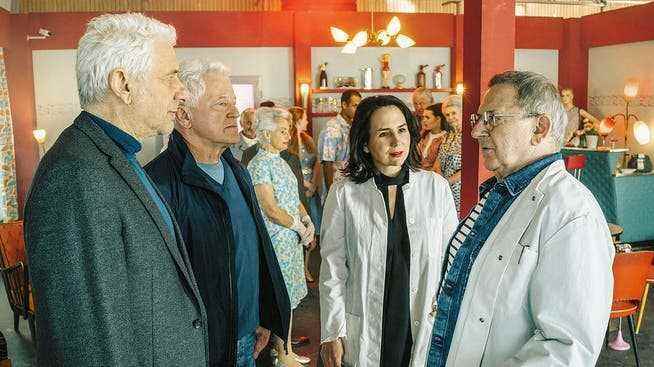A convicted murderer, a delicate therapy and a corpse in the junkyard: the Munich crime scene investigators are digging into the past.
Franz Leitmayr (Udo Wachtveitl) and Ivo Batic (Miroslav Nemec) are looking for a murderer, the neuropsychologists Laura Lechner (Anna Grisebach) and Ralph Vonderheiden (André Jung) could help. But may they?
His name is Alois Meininger and he murdered a young woman. On the banks of the Isar. Horrible. He met his victim in a nightclub and then brutally killed him. Flared the blond hair. A sex offender who acted out his obsessions, the tip of his psychiatrist convicted him. Sentence: life imprisonment, preventive detention. That was more than thirty years ago. Meininger is released. Shortly thereafter, another murder based on the same pattern. A young woman in a junkyard. And not a trace of Meininger. submerged.
So don’t lose any time, after all nobody knows whether Meininger won’t commit the next murder soon. Ivo Batic (Miroslav Nemec) and Franz Leitmayr (Udo Wachtveitl) are under pressure and decide to use an unconventional, more than questionable method. The key to solving the case lies with Norbert Prinz (Peter Franke), psychiatrist and Meininger’s therapist at the time. He might know where Meininger is. But Prinz has dementia, and you can’t hear a man with dementia. At least not in the way police officers are used to.
Cleaning supplies for example
So it has to be different. The chance is called reminiscence therapy. Professor Vonderheiden (André Jung), a renowned neuropsychologist, is considered their pioneer, and the Munich investigative duo asks him for help. Roughly speaking, Vonderheiden’s concept is based on deliberate deception. The patients are placed in an ambience that is familiar to them from the past. This should help bring her lost memory back into consciousness. To do this, the therapists recreate rooms that were important to the patients, play music from their youth, and emit scents that are associated with certain memories. Cleaning supplies for example.
The practice room in which he treated Meininger is being reconstructed for Norbert Prinz. In the hope that he will remember his patient, details of the conversations, and the police will find out where Meininger is. Sounds reasonable. Only, Vonderheiden’s memory theater is a therapy concept and not a police investigation tool. It should be good for the patient. And is it permissible to subject a sick old man to treatment that is not aimed at his well-being, but only to obtain information that the police would otherwise not be able to obtain?
on the living object
Vonderheiden’s employee thinks it’s completely impossible. Not impossible, he thinks. “We are looking for the truth,” says Batic. Time is running out. Meininger is walking around freely. Professor Vonderheiden responds to the request of the police, as does Prince’s daughter, who takes care of her father, after some hesitation. The experiment on the living object begins and leads to the traces of terrible events. Everyone reaches their limits, including Leitmayr, who is conducting the investigative talks with Prinz.
“That’s not a lab rat,” he says desperately. He means Prince, who is frightened by scraps of memory that are washed up without him being able to do anything with them. The memories turn to hell. That’s what the Munich “Tatort” episode “Flash” is about. Among other things. There’s quite a lot at stake in those ninety minutes, and to be honest, it’s pretty exhausting. Big questions are discussed: how to deal with people with dementia, the limits of police investigative methods, the abysses of medical ethics. An attractive plot – and a lot of adult education. Too much of. But in the end the culprit is caught and a life is saved. And everything is a little different than you thought.
“Tatort” from Munich: “Flash”, Sunday, 8:05 p.m., SF 1 / 8:15 p.m., ARD.
